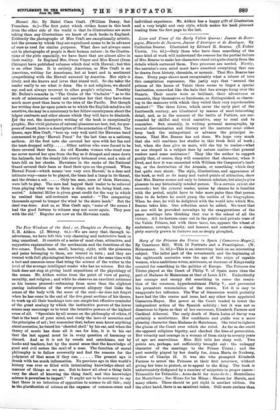Hawaii Nei. By Mabel Clare Craft. (William Doxey, San Francisco.
6s.)—The first point which strikes home in this book from the other side of the world is that its illustrations are more taking than any illustrations we know of such books in England. Evidently the photographs of Miss Craft are exceptionally artistic, but the process by which they are reproduced seems to be in advance of ours as used for similar purposes. What does not always come out in photographs of people is their human nature : in the illustra- tions of the girls especially, we have faces that are almost alive in their reality. In England Mrs. Owen Visger and Miss grout (from Chicago) have published volumes which deal with Hawaii ; but this is on other lines. It is entirely American, as Miss Craft is an American, writing for Americans, but at heart and in sentiment sympathising with the Hawaii annexed by America. Her style is lively, and she knows and loves that island well. So she takes the reader really to see what is done. She is not religions, we should say, and not always reverent to other people's religions. Possibly Mr. Bullen's remarks in " The Cruise of the Cachalot ' " as to the work of missionaries would not convince her that they have done much more good than harm to the isles of the Pacific. But though her writing does jar upon points as to which the English mind is a bit sensitive, she may be a missionary to her fellow-countrymen about the la r contracts and other abuses which they will have to diminish Fr the rest, the descriptive writing of the book is exceptionally graphic., Her vivid pictures of natural pleasures are best, but, for pur- poses of record, here is a description of the annexation of Hawaii. The Queen, says Miss Craft, " bore up very well until the Hawaian band commenced to play Hawaii Ponoi ' for the last time as a national anthem. At the first note she covered her eyes with her fan and
the taut dropped softly Other natives who were forced to be there covered their faces. An old Kanaka woman who stood near me never moved her eyes from the flag as it drooped and came down the halyards, but the steady lids slowly brimmed over, and a rain of tears fell on her cheeks. Hawaians in the ranks of the National Guard covered their faces or fixed their eyes on the ground. When Hawaii Ponoi—which means our very own Hawaii,' in a dear and intimate way—came to be played, the brass had a lump in its throat,
and the drums a sob Only ten men, none of them Hawaian, were left to play. The men had begged their leader to be relieved from playing what was to them a dirge, and he, being kind, con- sented." Admiral Miller is given great credit for the way in which he realised that self-restraint was needed : " The conquering thousands agreed to temper the wind to the shorn lamb." But the deed was done. And so, as Miss Craft says," some of the scenes I had the good fortune to witness may not occur again. They pass with the old." Bicycles are now on the Hawaian roads.


















































 Previous page
Previous page